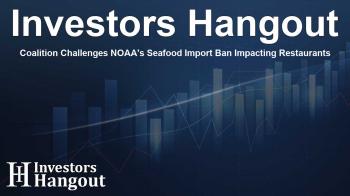Coalition Challenges NOAA's Seafood Import Ban Impacting Restaurants

Coalition Takes Action Against NOAA's Seafood Import Ban
In a significant move, the Restaurant Law Center, alongside the National Fisheries Institute and key seafood suppliers, has launched a lawsuit against the National Oceanic and Atmospheric Administration (NOAA). This legal action centers around the implementation of the Marine Mammal Protection Act (MMPA), which they argue has severe economic implications for American restaurants and their related supply chains.
Concerns Prompting Legal Action
The lawsuit directly challenges NOAA's recent decision that mandates a sweeping import ban set to take effect at the start of the new year. The timing of this ban, announced just four months prior, has raised alarm among stakeholders, particularly because these imports are critical to many U.S. restaurants' seafood offerings.
Executive Insights
“This isn't about opposing the Marine Mammal Protection Act; we fully support its objectives,” stated Angelo Amador, Executive Director of the Restaurant Law Center. “However, the rushed implementation by NOAA threatens to cripple the seafood supply chains that restaurants depend on. Without access to essential products, restaurants may have to eliminate popular seafood items from their menus, increase prices, or worse, shut down completely.”
Impact on Restaurants and Supply Chains
The Restaurant Law Center is a unique public policy organization focused on advocating for the foodservice industry in judicial settings. They express concern for the interests of over a million restaurants and foodservice venues across the nation. Their argument centers on the claim that NOAA has neglected to take into account the repercussions of its decision on U.S. businesses and indeed the broader implications on the seafood supply sectors, breaching the Administrative Procedure Act.
Challenges Ahead
“Restaurants are currently battling tight profit margins and labor shortages,” Amador pointed out. “The sudden ban will disrupt menus, cause contract violations, and lead to job losses throughout the foodservice sector. NOAA's lack of stakeholder engagement and disregard for the economic impacts of this decision is not only irresponsible—it’s unlawful.”
Plaintiffs Join Forces
The coalition behind the lawsuit includes seafood processors, importers, and distributors who collectively emphasize the absence of viable domestic alternatives to the imported products being targeted. American fisheries lack the capacity to provide the necessary volume, quality, or specific seafood varieties that the restaurant industry requires.
Furthermore, the complaint stresses that several affected foreign fisheries have made significant investments in sustainability practices and bycatch reduction, only to be denied access based on procedural oversights rather than genuine conservation results.
Legal Grounds and Future Steps
The lawsuit has been filed in the U.S. Court of International Trade located in New York City. The plaintiffs are pushing for the import bans to be lifted and seek a reevaluation by NOAA that aligns with a lawful, outcome-focused approach, consistent with the MMPA's objectives and the practical realities inherent in the global seafood supply chain.
Frequently Asked Questions
What are the main concerns regarding the NOAA's import ban?
The concerns largely revolve around the economic impact on restaurants and the seafood supply chain, which may face severe disruptions due to the ban.
Who is leading the lawsuit against NOAA?
The lawsuit is led by the Restaurant Law Center in partnership with the National Fisheries Institute and various seafood suppliers.
What has triggered the lawsuit?
The lawsuit was initiated in response to NOAA's import ban tied to the Marine Mammal Protection Act implementation.
What are the expected consequences of the import ban?
Expected consequences include potential menu changes, increased prices, and possible restaurant closures affecting the foodservice industry.
What do the plaintiffs hope to achieve?
The plaintiffs aim to vacate the import bans and prompt NOAA to reconsider its decision using a lawful and results-oriented framework.
About The Author
Contact Thomas Cooper privately here. Or send an email with ATTN: Thomas Cooper as the subject to contact@investorshangout.com.
About Investors Hangout
Investors Hangout is a leading online stock forum for financial discussion and learning, offering a wide range of free tools and resources. It draws in traders of all levels, who exchange market knowledge, investigate trading tactics, and keep an eye on industry developments in real time. Featuring financial articles, stock message boards, quotes, charts, company profiles, and live news updates. Through cooperative learning and a wealth of informational resources, it helps users from novices creating their first portfolios to experts honing their techniques. Join Investors Hangout today: https://investorshangout.com/
The content of this article is based on factual, publicly available information and does not represent legal, financial, or investment advice. Investors Hangout does not offer financial advice, and the author is not a licensed financial advisor. Consult a qualified advisor before making any financial or investment decisions based on this article. This article should not be considered advice to purchase, sell, or hold any securities or other investments. If any of the material provided here is inaccurate, please contact us for corrections.

